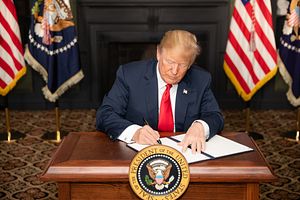On Monday, the Trump administration reimposed nuclear sanctions on Iran that had been withdrawn as part of the implementation of the Joint Comprehensive Plan of Action (JCPOA), the 2015 multilateral agreement to cap Iran’s civil nuclear program.
The sanctions reimposition was a logical consequence of the administration’s decision to place the United States in violation of its commitments under the JCPOA on May 8, effectively withdrawing Washington from the deal and leaving the remaining parties—Iran and the so-called P4+1 comprising France, the United Kingdom, Germany, Russia, and China—to scramble to find a way to preserve the deal.
On Monday, Trump signed an executive order to reimpose sanctions on the purchase of U.S. treasury notes by Iran, Tehran’s trade in “gold and other precious metals,” on a range of materials used in industrial processes, Iran rial-denominated transactions, “activities relating to Iran’s issuance of sovereign debt,” and Iran’s automotive sector. The measures were publicly announced in a White House release dubbed “President Donald J. Trump is Reimposing Sanctions Lifted Under the Horrible Iran Deal,” underlining the administration’s approach to the JCPOA with Trumpian flair.
August 6 marked the end of the first so-called wind-down period—what the administration was calling its effort to give foreign business ample warning to wind down any operations they’d set up in Iran following the implementation of the JCPOA. A second round of expanded sanctions—mostly focusing on Iran’s petroleum exports—will go into place in November, after the end of a second 90-day wind-down period.
The reimposition of sanctions begins what is likely the death-knell of the JCPOA. The core bargain at the center of the 2015 agreement was that Iran would agree to onerous and verifiable restrictions on its domestic enrichment capability and nuclear facilities in exchange for the removal of U.S. and EU-imposed nuclear-related sanctions. The United States has now violated its end of the bargain and, despite the best efforts of the P4+1 to make up to Iran what it loses by the U.S. move, it doesn’t appear that there is an obvious way to save the JCPOA.
The European Union, on Monday, vowed to do all it could to counter the U.S. move to reimpose sanctions. “We deeply regret the re-imposition of sanctions by the U.S.,” the EU, along with the ‘E3’ group of France, the United Kingdom, and Germany said in a statement. The EU’s primary tool at this point appears to be a newly imposed ‘Blocking Statute,’ designed to assuage the impact of reimposed U.S. sanctions on Iran.
“The Blocking Statute allows EU operators to recover damages arising from US extraterritorial sanctions from the persons causing them and nullifies the effect in the EU of any foreign court rulings based on them,” an EU release explained. “It also forbids EU persons from complying with those sanctions, unless exceptionally authorised to do so by the Commission in case non-compliance seriously damages their interests or the interests of the Union.”
The pace of events in the coming months is unclear and will likely depend on how the Iranian economy reacts to the shock of sanctions reimposition—and how global energy markets follow. Apart from the Trump administration’s nebulous disdain for the JCPOA, the sanctions reimposition no doubt serves the objectives of the administration’s many reflexively anti-Iranian regime ideologues, including Trump’s National Security Adviser John Bolton and Secretary of State Mike Pompeo.
These officials may hope to see the new sanctions destabilize the Iranian regime further; widespread protests over the economy in late-2017 and early-2018 demonstrated the relative fragility of the regime, with some protesters calling for the removal of the Iranian Supreme Leader, Ayatollah Ali Khamenei. The sanctions cannot be justified by any Iranian violation of the JCPOA, as Trump himself even acknowledged with his May 8 speech announcing the U.S. decision to violate the agreement. Instead, they could be a misguided attempt to foment regime change in Iran.
The bottom line, however, is that the JCPOA—the most detailed and ambitious arms control agreement of its kind—no longer meaningfully works in the way in which it was designed. That means that the clock is ticking on the verifiable constraints on Iran’s nuclear program. Tehran remains compliant with the deal’s provisions and has hedged the deal’s collapse already, by taking actions like the opening of a new facility for centrifuge production that, while not prohibited by the agreement, set it up for a resumption of large-scale enrichment activity.
Saving the JCPOA for the remainder of its lifespan will take a miracle, despite the best efforts of the P4+1. Above all, it would require the Trump administration to see the merits of the agreement as a verifiable constraint on Iran’s civil nuclear program. That won’t happen anytime soon.

































